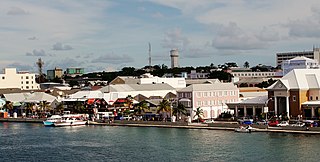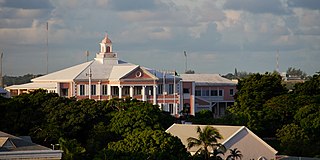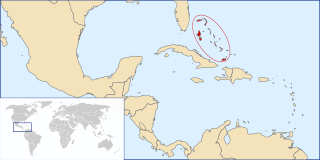
The Bahamas, officially the Commonwealth of The Bahamas, is an island country within the Lucayan Archipelago of the West Indies in the North Atlantic. It takes up 97% of the Lucayan Archipelago's land area and is home to 88% of the archipelago's population. The archipelagic state consists of more than 3,000 islands, cays, and islets in the Atlantic Ocean, and is located north of Cuba and northwest of the island of Hispaniola and the Turks and Caicos Islands, southeast of the U.S. state of Florida, and east of the Florida Keys. The capital is Nassau on the island of New Providence. The Royal Bahamas Defence Force describes The Bahamas' territory as encompassing 470,000 km2 (180,000 sq mi) of ocean space.

Nassau is the capital and largest city of The Bahamas. It is located on the island of New Providence, which had a population of 246,329 in 2010, or just over 70% of the entire population of The Bahamas. As of April 2023, the preliminary results of the 2022 census of the Bahamas reported a population of 296,522 for New Providence, 74.26% of the country's population. Nassau is commonly defined as a primate city, dwarfing all other towns in the country. It is the centre of commerce, education, law, administration, and media of the country.

The earliest arrival of people in the islands now known as The Bahamas was in the first millennium AD. The first inhabitants of the islands were the Lucayans, an Arawakan language-speaking Taino people, who arrived between about 500 and 800 AD from other islands of the Caribbean.
The music of the Bahamas is associated primarily with Junkanoo, a celebration which occurs on Boxing Day and again on New Year's Day. Parades and other celebrations mark the ceremony. Groups like The Baha Men, Ronnie Butler,Kirkland Bodie and Twindem have gained massive popularity in Japan, the United States and other places. Other popular Bahamian artists include Stileet and Stevie S.

Junkanoo is a festival that was originated during the period of African chattel slavery in British American colonies. It is practiced most notably in Jamaica, The Bahamas, and Belize as well as in Virginia, North Carolina and where there are significant settles of West Indian people during the post-emancipation era, including Miami. In the present day, there are considerable variations in performance and spelling but there are the shared elements of masquerade, drumming, dance and parading.
Afro-Caribbean people or African Caribbean are Caribbean people who trace their full or partial ancestry to sub-Saharan Africa. The majority of the modern African-Caribbeans descend from Africans taken as slaves to colonial Caribbean via the trans-Atlantic slave trade between the 15th and 19th centuries to work primarily on various sugar plantations and in domestic households. Other names for the ethnic group include Black Caribbean, Afro or Black West Indian or Afro or Black Antillean. The term Afro-Caribbean was not coined by Caribbean people themselves but was first used by European Americans in the late 1960s.
Bahamian culture is a hybrid of African, European, and other cultures.

Government House is the official residence of the governor-general of the Bahamas, located in Nassau. It was built in the colonial days and was the residence of the governor of the Bahamas. It later continued in the role of official residence and office of the governor-general following political independence from the United Kingdom in 1973.

Lesbian, gay, bisexual and transgender (LGBT) people in the Bahamas have limited legal protections. While same-sex sexual activity is legal in the Bahamas, there are no laws that address discrimination or harassment on the account of sexual orientation or gender identity, nor does it recognize same sex unions in any form, whether it be marriage or partnerships. Households headed by same-sex couples are also not eligible for any of the same rights given to opposite-sex married couples.

The monarchy of the Bahamas is a system of government in which a hereditary monarch is the sovereign and head of state of the Commonwealth of the Bahamas. The current Bahamian monarch and head of state since 8 September 2022, is King Charles III. As sovereign, he is the personal embodiment of the Bahamian Crown. Although the person of the sovereign is equally shared with 14 other independent countries within the Commonwealth of Nations, each country's monarchy is separate and legally distinct. As a result, the current monarch is officially titled King of the Bahamas and, in this capacity, he and other members of the royal family undertake public and private functions domestically and abroad as representatives of the Bahamian state. However, the King is the only member of the Royal Family with any constitutional role.

The following is an alphabetical list of topics related to the Commonwealth of The Bahamas.
James Carmichael Smith may refer to:
Afro-Bahamians are an ethnicity originating in The Bahamas of predominantly or partial native African descent. They are descendants of various African ethnic groups, many associated with the Bight of Biafra, Ghana, Songhai and Mali, the various Fula kingdoms, the Oyo Empire, and the Kingdom of Kongo. According to the 2010 Census, 92.7% of The Bahamas' population identifies as mixed African descent.
White Bahamians are Bahamian citizens of European ancestry, most of whom trace their ancestry back to England, Scotland and Ireland. Bahamians of European descent are sometimes called "Conchs", a term that is also applied to people of White Bahamian descent in Florida. White Bahamians were a majority in the 18th century, but now constitute less than 10% of the Bahamian population.
For a history of Afro-Caribbean people in the UK, see British African Caribbean community.

The Sierra Leone Creole people are an ethnic group of Sierra Leone. The Sierra Leone Creole people are descendants of freed African-American, Afro-Caribbean, and Liberated African slaves who settled in the Western Area of Sierra Leone between 1787 and about 1885. The colony was established by the British, supported by abolitionists, under the Sierra Leone Company as a place for freedmen. The settlers called their new settlement Freetown. Today, the Sierra Leone Creoles are 1.2 percent of the population of Sierra Leone.

The Nassau Guardian is a newspaper in The Bahamas, based in Nassau. Its first issue was published November 23, 1844. It is the largest newspaper in the Bahamas. The paper is one of the oldest continually published newspapers in the world and is considered a newspaper of record for The Bahamas.
Meta Davis Cumberbatch MBE was a Trinidad-born pianist, composer, poet, playwright and cultural activist, who spent the majority of her life in The Bahamas, where she used her talents to enhance the country's cultural development, becoming known as the "Mother of the Arts". At the 2014 Independence anniversary celebrations in Nassau she was honoured as a Bahamian "Cultural Warrior".
Louis Diston Powles (1842–1911) was an English barrister. He is now remembered for his outspoken memoir Land of the Pink Pearl of his time in the Bahamas as a stipendiary magistrate, during the 1880s.









